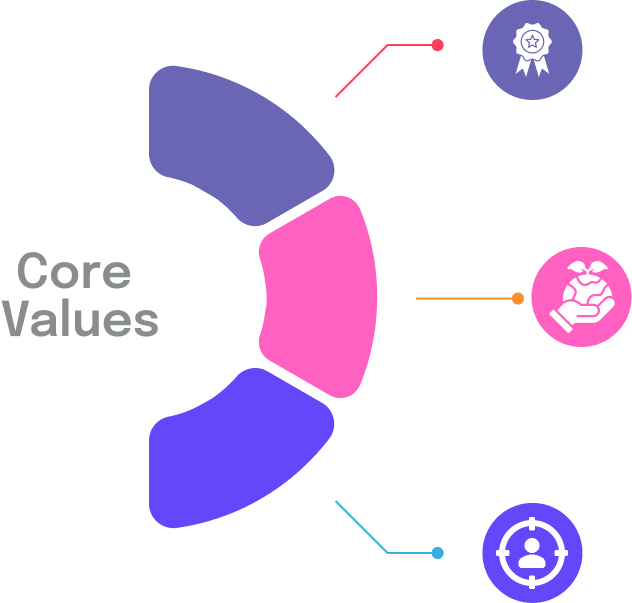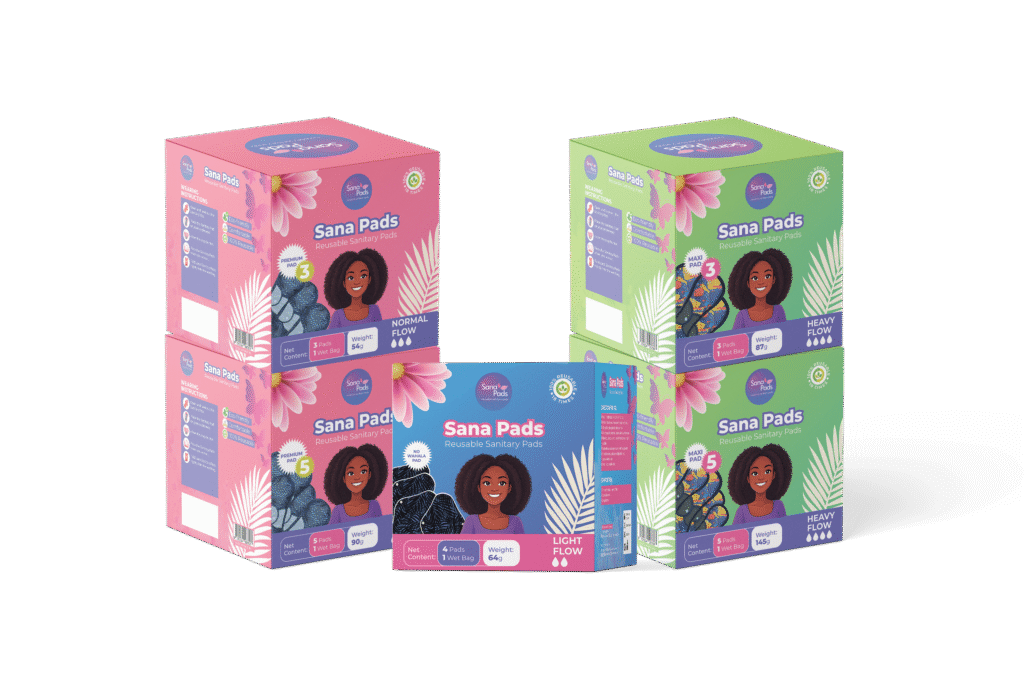Top 5 Things to Look for in a Reusable Pad Manufacturer in Nigeria
When Grace, a program officer at a leading Nigerian NGO, was tasked with sourcing reusable sanitary pads for 2,000 girls across three states, she thought it would be straightforward. After all, how different could manufacturers be? However, three months into the program, she discovered the hard truth: not all reusable pad manufacturers are created equal.
Some pads leaked after just two washes, others caused rashes, and worst of all, one supplier disappeared entirely after receiving payment. Grace’s experience isn’t unique—many organizations learn these lessons the hard way. But it doesn’t have to be this challenging.
Choosing the right reusable pad manufacturer can make the difference between a transformative program that keeps girls in school and a costly mistake that damages your organization’s credibility. Moreover, the right partnership ensures sustainable impact that extends far beyond the initial distribution.
Why Choosing the Right Manufacturer Matters for Your Program
The Impact on Girls' Education and Health
Every month, millions of Nigerian girls miss school because they lack access to safe, reliable menstrual products. Therefore, when your organization decides to distribute reusable pads, you’re not just providing a product—you’re offering hope, dignity, and the promise of uninterrupted education.
However, if those pads fail—whether through poor absorption, uncomfortable fit, or premature deterioration—you’re not just wasting resources. Furthermore, you’re potentially reinforcing the very barriers you set out to eliminate. Girls who experience leaks or discomfort may abandon the pads entirely, returning to unsafe alternatives or missing school altogether.
Quality reusable pads, on the other hand, can last 2-5 years with proper care. Consequently, your investment multiplies over time, providing ongoing protection that disposable products simply cannot match.
Your Organization's Reputation is at Stake
NGOs and government agencies operate on trust. Additionally, your beneficiaries, donors, and partners expect programs that deliver real, measurable impact. When you distribute substandard products, the consequences extend beyond immediate program failure.
Recipients may lose faith in future initiatives, making it harder to implement other health and education programs. Similarly, donors may question your organization’s ability to execute effectively, potentially affecting future funding opportunities.
On the contrary, successful programs create ripple effects of positive change. Parents become advocates, communities request expansion, and girls become ambassadors for menstrual health education.
Long-term Cost Implications
While the cheapest option might seem attractive initially, poor-quality pads often prove more expensive in the long run. Moreover, when pads fail early, organizations face unexpected replacement costs, emergency sourcing, and program delays.
Consider this: a quality pad costing ₦2,500 that lasts three years provides better value than a ₦1,500 pad that fails after six months. Additionally, reliable manufacturers offer bulk discounts, flexible payment terms, and ongoing support that reduces overall program costs.
Thing #1 - Quality Materials and Manufacturing Standards
What Materials Should You Look For?
The foundation of any reliable reusable pad lies in its materials. Consequently, understanding what goes into construction helps you evaluate manufacturers effectively.
Top Layer (Against Skin): Look for manufacturers using 100% cotton, bamboo fiber, or other natural materials. These fabrics are breathable, hypoallergenic, and gentle on sensitive skin. Furthermore, they wick moisture away from the body, keeping users dry and comfortable.
Absorbent Core: The middle layers should feature materials like bamboo fiber, microfiber, or cotton terry. Additionally, quality manufacturers use multiple layers to ensure adequate absorption without excessive bulk. Hemp fabric is particularly excellent for heavy flow days due to its superior absorbency.
Backing Layer: A reliable waterproof layer prevents leaks without using harsh plastics. TPU (thermoplastic polyurethane) is preferred over PVC because it’s more environmentally friendly and less likely to cause skin irritation.
Safety Certifications and Testing
Reputable manufacturers invest in proper testing and certifications. Therefore, ask potential suppliers about their quality control processes. Look for evidence of absorption testing, wash durability testing, and skin safety assessments.
The best manufacturers also test their products with real users before mass production. Additionally, they should provide documentation about their materials’ origins and safety profiles.
Questions to Ask About Production Quality
When evaluating manufacturers, ask these specific questions:
- What materials do you use for each layer, and where do you source them?
- How do you test for absorption capacity and durability?
- What quality control measures exist during production?
- Can you provide samples for testing before bulk orders?
Furthermore, request detailed product specifications and don’t hesitate to ask for references from other organizations.
About us

1. Excellence
2. Environmental Sustainability
3. Customer-Centric
serve.
Thing #2 - Regulatory Compliance and NAFDAC Registration
Why NAFDAC Registration is Non-Negotiable
In Nigeria, menstrual products fall under NAFDAC (National Agency for Food and Drug Administration and Control) regulation. Therefore, any manufacturer without proper NAFDAC registration is operating illegally and putting your organization at risk.
NAFDAC registration ensures that products meet safety standards and manufacturing requirements. Additionally, it provides legal protection for your organization and demonstrates the manufacturer’s commitment to compliance.
Working with unregistered manufacturers can result in:
- Legal liability for your organization
- Product seizure by regulatory authorities
- Inability to import or distribute products legally
- Damage to your organization’s reputation
Understanding Regulatory Standards for Menstrual Products
NAFDAC evaluates menstrual products based on several criteria, including material safety, absorption capacity, and manufacturing facility standards. Moreover, registered manufacturers undergo regular inspections to maintain their certification.
The registration process requires significant investment in documentation, testing, and facility upgrades. Consequently, manufacturers with NAFDAC registration demonstrate serious commitment to quality and legal compliance.
How to Verify Registration Status
Always verify NAFDAC registration independently. Furthermore, request the registration certificate and verify the number through NAFDAC’s official channels. Legitimate manufacturers will gladly provide this information and understand your need to verify it.
Be wary of manufacturers who claim registration is “in process” or provide excuses for not having documentation readily available. Additionally, check that the registration covers the specific products you intend to purchase.
Thing #3 - Digital Presence and Credibility Markers
The Importance of a Functional Website
In today’s digital age, a manufacturer’s online presence reveals much about their professionalism and stability. Therefore, evaluate their website carefully for signs of credibility and transparency.
A quality manufacturer’s website should include:
- Clear product specifications and pricing
- Company history and team information
- Contact details and physical address
- Testimonials and case studies
- Educational resources about menstrual health
Furthermore, the website should be regularly updated with current information. Outdated content or broken links often indicate operational challenges or lack of investment in the business.
Active Social Media Engagement
Social media activity demonstrates a manufacturer’s commitment to community engagement and customer service. Additionally, platforms like Facebook, Instagram, and LinkedIn provide insights into their values, interactions with customers, and consistency of messaging.
Look for manufacturers who:
- Post educational content about menstrual health
- Respond promptly to customer inquiries
- Share authentic user testimonials
- Demonstrate cultural sensitivity in their messaging
Moreover, active social media presence indicates the manufacturer understands modern communication channels and can support your organization’s advocacy efforts.
Online Reviews and Testimonials
Authentic reviews from previous customers provide valuable insights into product quality and customer service. However, be cautious of manufacturers with only positive reviews or testimonials that seem generic.
Look for detailed reviews that mention specific experiences with:
- Product durability and comfort
- Customer service responsiveness
- Delivery timelines and reliability
- After-sales support
Additionally, reach out to previous customers directly when possible to get honest feedback about their experience.
Transparency in Communication
Credible manufacturers communicate clearly and honestly about their capabilities, limitations, and processes. Furthermore, they provide detailed responses to questions and don’t make unrealistic promises about delivery times or product performance.
Warning signs include:
- Evasive answers about manufacturing processes
- Reluctance to provide references
- Inconsistent information across different communication channels
- Pressure to make quick decisions without adequate evaluation time
Premium Pad

No Wahala Pad
Thinner and ligher pad designed for
the last days of your period.
Contains leakproof layer at the back.


Thing #4 - Local Production and Cultural Understanding
Why Local Manufacturing Matters in Nigeria
Supporting local manufacturers creates multiple benefits beyond just product procurement. Therefore, prioritizing Nigerian manufacturers strengthens the entire ecosystem of menstrual health support.
Local production ensures:
- Faster delivery times and reduced shipping costs
- Better understanding of local climate and usage conditions
- Support for Nigerian economic development
- Easier quality control and facility visits
- More responsive customer service and problem resolution
Additionally, local manufacturers are more likely to understand the specific challenges Nigerian girls face, from climate considerations to cultural preferences.
Cultural Sensitivity in Design
Nigerian girls have diverse needs based on their age, body type, cultural background, and lifestyle. Consequently, manufacturers who understand these nuances create more appropriate products.
Look for manufacturers who demonstrate understanding of:
- Different flow patterns and cultural taboos
- Appropriate sizing for Nigerian body types
- Color preferences and cultural significance
- Care instructions suitable for local water and washing conditions
Furthermore, culturally sensitive manufacturers often provide educational materials in local languages and work with community leaders to ensure acceptance.
Supporting Local Economic Development
When you choose local manufacturers, you’re investing in Nigeria’s industrial capacity and creating employment opportunities. Moreover, successful partnerships often lead to expanded operations, additional job creation, and technology transfer.
Local manufacturers also understand Nigerian business practices, payment systems, and regulatory requirements. Additionally, they’re more accessible for ongoing collaboration and program support
Thing #5 - Proven Track Record and Comprehensive Support
Evidence of Real Social Impact
Established manufacturers should demonstrate measurable impact through their previous work. Therefore, ask for specific data about their contributions to menstrual health and education outcomes.
Quality manufacturers track metrics like:
- Number of girls served across different programs
- School attendance improvements in their programs
- Product durability and user satisfaction rates
- Environmental impact through waste reduction
Furthermore, they should provide case studies showing how their products contributed to broader program goals beyond just product distribution.
Training Materials and Educational Resources
The best reusable pad programs combine product distribution with comprehensive education. Consequently, manufacturers who provide training materials and educational support create more successful outcomes.
Look for manufacturers offering:
- User instruction guides in appropriate languages
- Training materials for program implementers
- Educational resources about menstrual hygiene
- Ongoing technical support for questions
Additionally, some manufacturers provide training sessions for your team, ensuring effective program implementation and user education.
Scalability and Reliable Supply Chain
Your organization’s needs may grow over time, so choose manufacturers capable of scaling production accordingly. Moreover, reliable supply chains ensure consistent product availability and quality.
Evaluate manufacturers based on:
- Current production capacity and expansion capabilities
- Raw material sourcing stability
- Quality control systems that scale effectively
- Financial stability to support large orders
Furthermore, discuss future partnership possibilities and growth projections to ensure long-term compatibility.
Ongoing Partnership Support
The relationship with your manufacturer shouldn’t end at delivery. Therefore, look for partners who provide ongoing support throughout your program implementation.
Quality manufacturers offer:
- Technical support for product-related questions
- Replacement programs for defective products
- Feedback collection and product improvement processes
- Assistance with program evaluation and reporting
Additionally, they should be responsive to concerns and willing to adapt based on your program’s evolving needs.
Time to get involved
Red Flags to Avoid When Selecting a Manufacturer
Missing NAFDAC Registration
Never compromise on regulatory compliance, regardless of price or other advantages. Manufacturers without NAFDAC registration cannot legally sell menstrual products in Nigeria. Furthermore, working with unregistered manufacturers exposes your organization to legal and reputational risks.
If a manufacturer claims registration is pending, request documentation and timeline for completion. Additionally, consider delaying partnerships until proper registration is obtained.
Poor or Non-Existent Online Presence
In 2024, legitimate businesses maintain professional online presence. Therefore, be cautious of manufacturers with outdated websites, inactive social media, or lack of digital footprint altogether.
Red flags include:
- Websites with no recent updates or broken functionality
- No social media presence or inactive accounts
- Lack of online reviews or testimonials
- Inconsistent contact information across platforms
Moreover, poor online presence often indicates operational challenges or lack of investment in business development.
Too-Good-to-Be-True Pricing
While cost is important, extremely low prices often indicate compromised quality or unsustainable business practices. Furthermore, manufacturers offering prices significantly below market rates may not be able to maintain quality or service standards.
Consider the total cost of ownership, including:
- Product durability and replacement needs
- Shipping and handling costs
- Training and support services
- Potential costs of program failure
Additionally, remember that investing in quality products creates better outcomes and long-term cost savings.
Lack of User Feedback or Local Understanding
Manufacturers who cannot provide authentic user testimonials or demonstrate understanding of local conditions raise serious concerns. Moreover, effective menstrual health programs require deep understanding of cultural, social, and practical factors affecting users.
Warning signs include:
- Generic testimonials without specific details
- Inability to discuss local challenges and solutions
- No evidence of user testing or feedback collection
- Lack of cultural sensitivity in product design or marketing
How Sana Pads Measures Up - Your Trusted Partner
Our Regulatory Compliance and Quality Standards
At Sana Pads, we prioritize regulatory compliance and quality above all else. Furthermore, our NAFDAC registration ensures that every product meets Nigeria’s safety and quality standards.
Our quality commitment includes:
- Using only certified organic cotton and bamboo fiber materials
- Multiple absorption layers designed for Nigerian climate and usage patterns
- Rigorous testing for durability, absorption, and skin safety
- Quality control processes at every production stage
Additionally, we maintain detailed documentation for all materials and processes, ensuring complete transparency with our partners.
Our Digital Transparency and Community Engagement
We believe in open communication and transparent operations. Therefore, our website provides comprehensive information about our products, impact, and partnerships.
You can find us actively engaging across digital platforms:
- Regular updates on our website with program results and testimonials
- Active social media presence with educational content and community interaction
- Responsive customer service through multiple communication channels
- Detailed case studies and impact reports available upon request
Moreover, we welcome facility visits and encourage partners to verify our claims through direct observation.
Our Local Impact and Partnership Success Stories
Since our founding, Sana Pads has supported over 900 women and girls through sales and donations. Additionally, we’ve kept more than 1,144 pads in circulation and prevented over 122,688 disposable pads from entering landfills.
Our partnership success includes:
- Collaboration with multiple NGOs across Nigeria
- Government agency partnerships for large-scale distribution
- School programs that improved attendance rates
- Community education initiatives that changed attitudes toward menstruation
Furthermore, we provide comprehensive support including training materials, user education resources, and ongoing technical assistance.
Testimonials
Women around the world patronize Sana

“Buying disposable pads every month really added up, so I thought I’d give Sana Pads a try. I was surprised by how soft they are, and they work well for long days at university.
Washing them is simple, and I haven’t had to buy new pads in months, which has saved me money. I also like that they’re more eco-friendly. It feels good to have an option that’s both affordable and better for the environment.”
Women around the world patronize Sana

I used to feel nervous about going to school during my period because regular pads would leak or feel uncomfortable after a while. I decided to try Sana Pads, and I’m honestly relieved.
They’re comfortable, easy to wash, and don’t irritate my skin like some other pads do. It’s nice to know I have something I can rely on, and I don’t have to worry about restocking every month. Plus, I love supporting something that’s actually helping girls like me.
Fatima Adesina
Women around the world patronize Sana

It is very good and it saves me money.
There are those times when I don’t have any money but I am happy that I always have my Sana Pads ready for use whenever it is that time of the month.
Racheal Tarttive
Making the Right Choice for Your Community
Essential Questions to Ask Potential Manufacturers
Before making your final decision, ensure you have clear answers to these critical questions:
About Regulatory Compliance:
- Can you provide your current NAFDAC registration certificate?
- Are all your products covered under this registration?
- When was your last regulatory inspection?
About Quality and Materials:
- What specific materials do you use in each product layer?
- Can you provide material safety documentation?
- What quality control processes do you follow?
- Can we visit your production facility?
About Business Credibility:
- How long have you been in business?
- Can you provide references from recent large-scale partners?
- What is your current production capacity?
- How do you handle quality issues or defective products?
About Support and Partnership:
- What training materials and resources do you provide?
- How do you support program implementation?
- What are your payment terms and delivery timelines?
- How do you handle scaling up for larger orders?
Next Steps for Your Organization
Choosing the right reusable pad manufacturer requires careful evaluation and due diligence. However, the investment in proper selection pays dividends through successful programs and positive impact.
Start by creating evaluation criteria based on the five key factors outlined in this guide. Then, request detailed proposals from potential manufacturers, including samples for testing and evaluation.
Most importantly, don’t rush the decision. Take time to verify credentials, speak with references, and test products thoroughly. The girls and women your organization serves deserve nothing less than the highest quality products and support.
Remember Grace’s story from the beginning? After her initial challenges, she implemented a rigorous manufacturer evaluation process. Her next program, partnering with a properly vetted manufacturer, exceeded all expectations and became a model for other organizations.
Conclusion
Your organization can achieve similar success by choosing manufacturers who demonstrate quality, compliance, credibility, cultural understanding, and comprehensive support. The right partnership transforms reusable pad distribution from a simple procurement exercise into a powerful tool for social change.
Ready to find your ideal manufacturing partner? Take the first step by reaching out to learn more about how quality manufacturers like Sana Pads can support your organization’s mission to improve menstrual health and education outcomes across Nigeria.

Author: Margaret Ochegbudu

